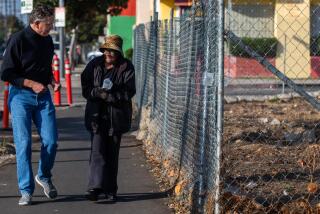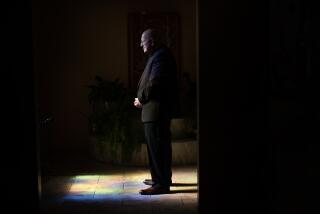He’s Part Coach, Part Referee
- Share via
When Michael Lythcott came to the embattled neighborhood of Harbor Gateway last summer, there was poison in the air. Fed up with living in the shadow of a chemical graveyard, residents of this Torrance-area community had managed to initiate negotiations with their corporate adversaries--Shell Oil, Dow Chemical and Montrose Chemical. But the talks were marred by venomous distrust and the sides quickly deadlocked, raising the specter of a long and potentially fruitless struggle.
Then Lythcott went to work, armed with the conviction that common ground could be found. Nine months later, a historic settlement was announced. For the first time in a Superfund case, the responsible companies voluntarily agreed to buy out a neighborhood and pick up the tab for relocating residents. The deal, which also calls for environmental cleanup measures at the Del Amo Waste Pits, will cost Shell and Dow an estimated $10 million. The federal government will also foot part of the total bill, which is not yet determined. (Montrose walked out of the negotiations and now faces an array of lawsuits.)
The agreement represents the latest in a series of breakthroughs for Lythcott, who has created an unusual niche in what’s known as the environmental justice movement. Over the last few years, he has helped contaminated communities from Florida to Louisiana to California escape the sometimes lethal legacy wrought by American industry.
Yet Lythcott, who’s based in Martha’s Vineyard, Mass., is less a toxic avenger than an environmental peacemaker. Though he considers himself an advocate for the mostly poor neighborhoods saddled with America’s chemical-waste burden, his weapons of choice are dialogue and compromise.
“What I see now in my work in environmental justice is what I call a ritual defensiveness,” says Lythcott, sitting in the offices of the Del Amo Action Committee, half a mile from the waste pits. “If you’re the polluter, I anticipate your argument. If I’m the community, you anticipate mine. And no one’s really listening. No one is pausing in the confrontation long enough to see whether the landscape has changed.”
Indeed, the relationship between communities and polluters has shifted continually over the last 20 years. First came government regulations designed to rein in the industrial giants that for decades contaminated neighborhoods with virtual impunity. Then grass-roots organizations began to spring up around the country, galvanized by the political awareness that dumping toxic waste in economically desperate areas amounts to environmental discrimination. This pervasive pattern, documented in both government and private studies, gave birth to the environmental justice movement, supported not only by advocacy groups but the federal government.
As a result, corporate executives--though not necessarily more ecologically enlightened--are far more sensitive to public health concerns than in the past. Realizing this, Lythcott has devoted himself to breaking down the barriers between communities and the companies they view as their enemies.
“What I’m doing is teaching communities how to speak in a way that they can be heard, because at a certain point you have to decide: Do I want to be right or do I want to be effective?” he says.
In the Del Amo case, leaders of both parties to the dispute attest to his skills.
“I don’t think we could have been successful without Michael’s help,” says Del Amo Action Committee leader Cynthia Babich, who, like many residents of the largely Latino 204th Street neighborhood, has experienced serious health problems that she believes were caused by asbestos, benzene and other toxic substances buried near her home. “I think we would have beat each other over the head.”
Chuck Paine, who represented Shell in the negotiations, echoes that view. “Michael recognized the emotional issues and allowed the people to express themselves. But then he’d take them back and tell them, ‘Here’s the reality.’ Without him, the negotiations would have broken down.”
*
As his dizzying resume shows, Lythcott has spent most of his adult life as a peripatetic champion of communication. After graduating from Oberlin College in Ohio, he became a trainer for Vista and later the Peace Corps, overhauling those organizations’ cross-cultural curricula to reflect the principles of empowerment and self-reliance.
Switching gears, Lythcott moved into the corporate world, applying his knowledge of cultural sensitivity to employee training for such clients as General Motors, DuPont, CBS and ABC. Then, in 1989, he went to work for Prudential as an environmental relocation specialist; a few years later, he struck out on his own as an independent consultant for communities seeking refuge from what he calls “toxic ghettos.” The progression, he says, was a natural one.
Nevertheless, Lythcott’s relationship with corporations would potentially seem to undermine his credentials among community activists. On the contrary, he says--his business pedigree enhances his effectiveness.
Grover Hankins, director of the Environmental Justice Law Clinic at Texas Southern University’s Thurgood Marshall School of Law, agrees. “When he works with these corporate types, they know that Michael knows where all of their aces are,” says Hankins, who has consulted with Lythcott on several projects, including the Del Amo case. “They can’t hide anything up their sleeves.”
For those who may question his loyalties, Lythcott points to his track record in helping beleaguered communities, which includes pro bono work for various grass-roots organizations. Among his current projects is a toxic industrial site in New Bedford, Mass., where he is donating his services to residents trying to ensure the safe demolition of the plant.
Activist John Andrade credits Lythcott with re-energizing the community after a number of setbacks. “He was very stern, very strong, very upbeat,” Andrade says. “He put life back into what we were doing.”
*
Lythcott’s modus operandi is a combination of hard-nosed fact-finding and old-fashioned fraternizing. He does extensive research on the corporations involved in a case and gathers voluminous data on real estate values in the affected area, which he uses to negotiate the best settlement possible. At the same time, he plunges himself into the community, establishing personal relationships with residents.
To help steer Harbor Gateway’s 204th Street neighborhood in the right direction, Lythcott developed a set of “guiding principles,” which he describes as follows: “We didn’t pollute our neighborhood. We don’t want to stay here. We want to be kept whole financially and socially. We want comparable homes in comparable neighborhoods away from poison.”
The initial offer made by Dow and Shell consisted of 12 lines of text. By the time Lythcott and the Del Amo Action Committee were through, the companies had put their signatures to a settlement containing 364 lines. The agreement covers everything from relocation costs and rent differential to appraisal methodology, equity protection, and credit for incomplete renovations and special landscaping. It also provides for counseling to address the intense anxiety of individuals going through the relocation process--especially those whose homes are next to a Superfund site.
Residents are now making preparations to leave their neighborhood. Appraisals for the 65 homes included in the buyout have been done, and some people have received offers from Prudential, which is administering the relocation program. Though community activists are unhappy that Shell and Dow have yet to release any money, they expect the funds to be available by the beginning of June.
While Lythcott worked hard on the specific terms of the Del Amo settlement, the ultimate goal, he says, was to help people empower themselves. “There’s a credo on the wall in my office that I’ve carried with me since Peace Corps days. I use it inside corporations and I use it in communities. It says, ‘Go to the people. Listen to them, learn from them. Start with what they already have, build on what they already know. And when the job is done, and you’ve gone, they will turn to themselves and say, “Look what we have done for ourselves.” ’ “
Thanks to his growing stature, Lythcott now finds communities coming to him. In the Del Amo case, when Shell and Dow offered to bring in an environmental relocation expert from Prudential, Babich demanded that they hire Lythcott instead.
“I made it clear to Michael that he would get money from Shell and Dow, but he’d be working for us,” she says. “He really became one of us in the community, and the people here love him. He inspired them to fight for themselves.”
More to Read
Sign up for Essential California
The most important California stories and recommendations in your inbox every morning.
You may occasionally receive promotional content from the Los Angeles Times.









